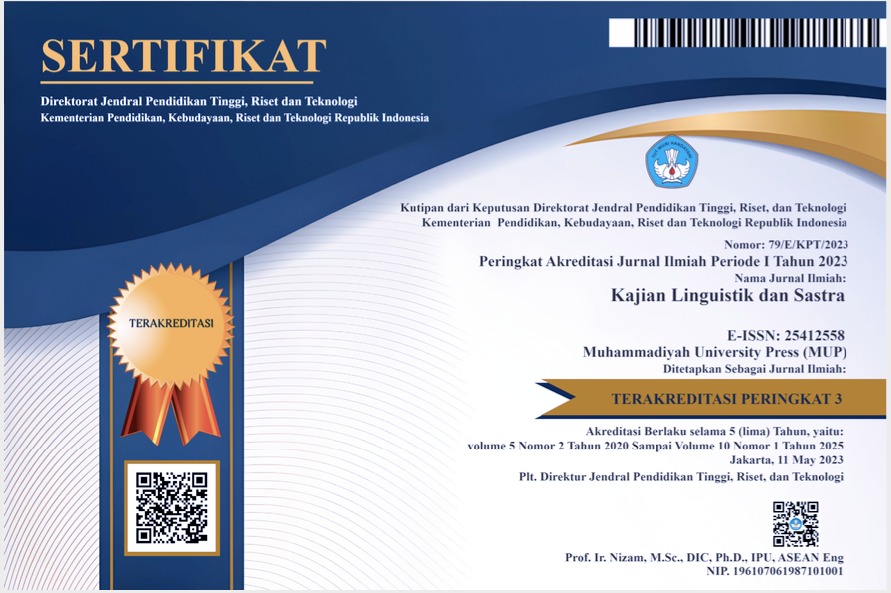Tendensi Pola Komunikasi Interaksional di SMK PGRI 2 Jember (Kajian Etnografi Komunikasi)
DOI:
https://doi.org/10.23917/kls.v9i1.3541Keywords:
guru, makna tindakan, murid, pola komunikasi, topik pembicaraanAbstract
Each individual's language skills influence the effectiveness of ongoing communication interactions and
this is in line with optimizing the communication goals themselves. This research aims to identify trends
in interactional communication patterns that occur at SMK PGRI 2 Jember and describe the types of
conversation topics and language boundaries that influence the meanings that emerge behind the
speaker's actions. This research was analyzed using qualitative descriptive methods. The data in this
research is in the form of communication interactions that occur consistently and contain interactional
communication patterns. The data acquisition stage is through observation and recording the finding of
communication patterns. Data were analyzed using the ethnographic communication theory proposed
by Spradley and supported by literature study. The stage of presenting the results of data analysis uses
informal methods. The research results show that interactional communication patterns are broken
down into several mappings, namely between students and students, students and teachers, and
teachers and teachers. The communication patterns that occur tend to have a systematic consistency
that is formed naturally and operates interactionally. The topics of discussion that emerged in
interactions between participants focused on several specific themes, namely learning, administration,
finance, entertainment and friendship problems. Meanwhile, topics that are avoided in conversation
include political contexts, bullying and social mistakes. The languages used in communication
interactions consist of Indonesian, Madurese, Javanese and English. This is influenced by the geographical location of SMK PGRI 2 Jember which is located near the center of Jember Regency.
Downloads
References
A. Mucharam, “Membangun Komunikasi Publik yang Efektif,” Ikon J. Ilmu Komun., vol. 27,no. 1, pp. 71–82, 2022, Accessed: Apr. 29, 2024. [Online]. Available: https://journals.upi-
yai.ac.id/index.php/IKON/article/download/1830/1495/
S. Safitri, D. Nuraini, D. Wijaya, and D. Hermawan, “Pola Komunikasi Internal Organisasi
SMK Amaliah 1 Ciawi dalam Meningkatkan Pelayanan kepada Peserta Didik,” Karimah
Tauhid, vol. 2, no. 1, pp. 16–25, 2023, doi:
https://doi.org/10.30997/karimahtauhid.v2i1.7537.
R. Rahmawati and E. Suryadi, “Kreativitas Mengajar Guru dan Komunikasi Interaksional
sebagai Determinan terhadap Prestasi Belajar Siswa,” J. Pendidik. Manaj. Perkantoran, vol.
, no. 2, pp. 190–198, Jul. 2019, doi: 10.17509/jpm.v4i2.18014. DOI: https://doi.org/10.17509/jpm.v4i2.18014
K. Z. Darmawan, “Penelitian Etnografi Komunikasi: Tipe dan Metode,” Mediat. J. Komun.,
vol. 9, no. 1, pp. 181–188, 2008, doi: 10.29313/mediator.v9i1.1142. DOI: https://doi.org/10.29313/mediator.v9i1.1142
D. S. Fauziya, “Model Pemrosesan Informasi Gaya Suara Anda Berbasis Komunikasi
Interaksional dalam Pembelajaran Berbicara,” J. Ilm. Progr. Stud. Pendidik. Bhs. dan Sastrai
Indones., pp. 46–59, 2018, Accessed: Dec. 11, 2023. [Online]. Available: http://e-
journal.stkipsiliwangi.ac.id/index.php/semantik/article/view/278/216
M. Mahmudah and M. A. Mansyur, “Komunikasi Antar Budaya Masyarakat Jawa dan
Madura,” JKaKa J. Komun. dan Konseling Islam, vol. 1, no. 1, pp. 1–13, Jan. 2021, doi: DOI: https://doi.org/10.30739/jkaka.v1i1.805
30739/jkaka.v1i1.805.
W. Wulandari, Y. F. Furnamasari, and D. A. Dewi, “Urgensi Rasa Nasionalisme pada
Generasi Z di Tengah Era Globalisasi,” J. Pendidik. Tambusai, vol. 5, no. 3, pp. 7255–7260,
, [Online]. Available: https://jptam.org/index.php/jptam/article/view/2134.
E. J. Daeli, J. Junaidi, and C. A. Nuraflah, “Peranan Pola Komunikasi Pimpinan terhadap
Motivasi Kerja Karyawan pada waroengberita.com,” Netw. Media, vol. 6, no. 2, pp. 50–58,
, doi: 10.46576/jnm.v6i2.3537. DOI: https://doi.org/10.46576/jnm.v6i2.3537
R. Fajriati, N. Na’imah, H. Hibana, K. Z. Putro, and L. Labziah, “Pola Komunikasi dalam
Proses Pembelajaran di Masa Pandemi Covid-19,” J. Obs. J. Pendidik. Anak Usia Dini, vol. 6, no. 5, pp. 3877–3888, 2022, doi: 10.31004/obsesi.v6i5.1730. DOI: https://doi.org/10.31004/obsesi.v6i5.1730
B. R. Ramadhani, D. P. Ayuningtyas, N. A. Rahayu, R. Robiansyah, R. F. Andhika, and D.
Hidayat, “Pola Komunikasi Karyawan pada Masa Work From Home,” J. Digit. Media dan
Relatsh., vol. 3, no. 1, pp. 24–29, 2021, doi: 10.51977/jdigital.v3i1.512. DOI: https://doi.org/10.51977/jdigital.v3i1.512
A. P. Sidik and N. Sanusi, “Pola Komunikasi Mahasiswa di Media Sosial (Studi Etnografi
Komunikasi pada Mahasiswa USB YPKP),” J. Common, vol. 3, no. 1, pp. 26–33, 2019, DOI: https://doi.org/10.34010/common.v3i1.1949
Accessed: Oct. 28, 2023. [Online]. Available:
https://www.mendeley.com/catalogue/044d7439-3c98-3bed-8651-1e6583127452.
F. Anggriawan, “Gaya Komunikasi Pimpinan terhadap Motivasi Kerja Karyawan pada PT
Perusahaan Listrik Samarinda,” eJournal Ilmu Komun., vol. 5, no. 4, pp. 260–274, 2017,
[Online]. Available: https://ejournal.ilkom.fisip-unmul.ac.id/site/?p=3374#.
Aries, R. Mardiyansyah, and S. Santana, “Pemenuhan Nilai Investigasi dalam Konten
YouTube Watchdoc,” Pros. Jurnalistik, vol. 6, no. 2, pp. 127–130, 2020, doi:
http://dx.doi.org/10.29313/.v6i2.23221.
R. S. Qurniawati and Y. A. Nurohman, “eWOM pada Generasi Z di Sosial Media,” J. Manaj.
Dayasaing, vol. 20, no. 2, pp. 70–80, 2018, doi: DOI: https://doi.org/10.1080/15210960.2018.1447067
https://doi.org/10.23917/dayasaing.v20i2.6790.
W. Darmalaksana, “Metode Penelitian Kualitatif Studi Pustaka dan Studi Lapangan,” Pre-
print Digit. Libr. UIN Sunan Gunung Djati Bandung, pp. 1–6, 2020, [Online]. Available:
https://etheses.uinsgd.ac.id/id/eprint/32855.
L. Z. Lutfiyah and K. P. Kinanti, “Peran Perempuan Masa Kini pada Iklan Televisi (Kajian
Semiotika Roland Barthes),” Basastra, vol. 9, no. 3, pp. 311–326, Dec. 2020, doi: DOI: https://doi.org/10.24114/bss.v9i3.19921
24114/bss.v9i3.19921.
E. S. Anggraini, “Pola Komunikasi Guru dalam Pembelajaran Anak Usia Dini melalui
Bermain,” J. Bunga Rampai Usia Emas, vol. 7, no. 1, pp. 27–37, 2021, doi: DOI: https://doi.org/10.24114/jbrue.v7i1.25783
24114/jbrue.v7i1.25783.










